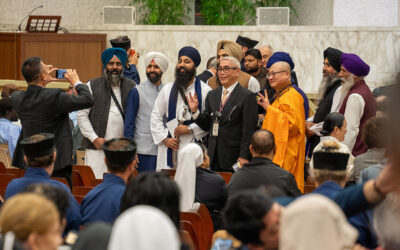 The many answers to the questionnaire give a very clear picture of the real-life situation of the family in the world. Are there any signs of hope among the many problems aired? The first sign of hope is the Synod itself. Pope Francis wanted it, and this is a sign that the family is a priority even for the Pope. Trust in the Church as an institution has increased because people are discovering that the Church can be an anchor for the family. Another sign of hope is the great potential of families who live conjugal fidelity and openness to life, who support families marked by the problems of separation. These families are, so to say, a “resource”, because while caring and supporting others to carry their burdens,they help them not feel excluded from the Church, or worse still, from the love of God. Several extracts of the Instrumentum laboris emphasize the need of renewed mercy in addressing family difficulties. Will this be the prevailing attitude at the Synod? It seems illusory to expect extraordinary and universal solutions. We hope that the potential of the family, which I have spoken of, will emerge, and that it will not be just criticality. However, one cannot tone down the problem about the sacramental question. The sacraments are efficacious signs of grace. There may be others as well. Recently I received a letter from a Christian lady, who is civilly married to a divorced man. In spite of this fact, she has never felt excluded from the Church and at the distribution of the Eucharist she joins in the line, and the priest’s blessing strengthens the presence of Jesus in her. “I’m on a journey”, she said. It is a journey of faith, beyond the sacraments, that can lead to holiness. When answering the questionnaire, most of the local Churches insisted on the difficulty encountered to understand the Church’s message on marriage and family. Does this mean that the contents have to be revised or does it mean that the language has to be altered? Objections about the contents of the Magisterium documents may be made by those who want to bring to their own measure God’s plan for man and woman. However, some suggestions need to be made about the language of the documents, especially of those dealing with moral issues. More clarity, simplicity and conciseness are required. The average family lives a tight daily program, is pressed by various tasks and a lot of stress, and has no time to read. The Magisterium documents need to demonstrate agility, ability to comprehend the fatigue of those who, despite taking great pains, feel vulnerable. When dealing with young couples, the Church is faced with the problem of re-evangelization, which, at the same time, is an educational problem. What can be done about this? Recently, when the Focolare Movement was received in audience by Pope Francis, he reminded us of our duty “to educate” and to pass on the gifts we received to others. This suggestion is very dear to us. In fact, the Focolare Movement promotes an ongoing formation to all its members, from children to workers, from engaged couples to the elderly, from young people to separated persons, and so on. We are committed to give an ongoing formation that is always more appropriate. However, we have to admit that the media plays a great part – more negative than positive – in the field of the family and of young families. Some media programs introduce transgressive lifestyles and offer models of man and woman that lack reference to values. However, I am convinced there is a way we can plunge through! The dark evil that disorientates families in many parts of the world is a danger mix of individualism and crises, even the economical crisis. What are the initiatives of the Focolare Movement to combat this mentality? A very important initiative is the network of families, who are close to families in difficulty through their discreet support that encourages reconciliation. For couples passing through serious marital difficulties, we have held weekend encounters in the little towns of the Movement. Through relational techniques by experts, but mainly through the contact with the spirituality of unity, these couples manage to find themselves in the hope of a future together. Relationships and meetings for those separated or abandoned alleviate the burden of their loneliness and strengthen their commitment of fidelity to the sacrament. There are also initiatives for couples who have started a new union, sharing with them the educational experience of the children and the desire to feel embraced by the Church and, above all, by God’s love. Having in mind the objective to prevent marriage breakdown, we have recently intensified both our commitment to work for young families and also to instill back into our youth the enchantment of “forever”. Translated in English from the original article in Italian: http://www.avvenire.it/Cronaca/Pagine/Maria-Voce-in-rete-per-dire-no-a-individualismo.aspx
The many answers to the questionnaire give a very clear picture of the real-life situation of the family in the world. Are there any signs of hope among the many problems aired? The first sign of hope is the Synod itself. Pope Francis wanted it, and this is a sign that the family is a priority even for the Pope. Trust in the Church as an institution has increased because people are discovering that the Church can be an anchor for the family. Another sign of hope is the great potential of families who live conjugal fidelity and openness to life, who support families marked by the problems of separation. These families are, so to say, a “resource”, because while caring and supporting others to carry their burdens,they help them not feel excluded from the Church, or worse still, from the love of God. Several extracts of the Instrumentum laboris emphasize the need of renewed mercy in addressing family difficulties. Will this be the prevailing attitude at the Synod? It seems illusory to expect extraordinary and universal solutions. We hope that the potential of the family, which I have spoken of, will emerge, and that it will not be just criticality. However, one cannot tone down the problem about the sacramental question. The sacraments are efficacious signs of grace. There may be others as well. Recently I received a letter from a Christian lady, who is civilly married to a divorced man. In spite of this fact, she has never felt excluded from the Church and at the distribution of the Eucharist she joins in the line, and the priest’s blessing strengthens the presence of Jesus in her. “I’m on a journey”, she said. It is a journey of faith, beyond the sacraments, that can lead to holiness. When answering the questionnaire, most of the local Churches insisted on the difficulty encountered to understand the Church’s message on marriage and family. Does this mean that the contents have to be revised or does it mean that the language has to be altered? Objections about the contents of the Magisterium documents may be made by those who want to bring to their own measure God’s plan for man and woman. However, some suggestions need to be made about the language of the documents, especially of those dealing with moral issues. More clarity, simplicity and conciseness are required. The average family lives a tight daily program, is pressed by various tasks and a lot of stress, and has no time to read. The Magisterium documents need to demonstrate agility, ability to comprehend the fatigue of those who, despite taking great pains, feel vulnerable. When dealing with young couples, the Church is faced with the problem of re-evangelization, which, at the same time, is an educational problem. What can be done about this? Recently, when the Focolare Movement was received in audience by Pope Francis, he reminded us of our duty “to educate” and to pass on the gifts we received to others. This suggestion is very dear to us. In fact, the Focolare Movement promotes an ongoing formation to all its members, from children to workers, from engaged couples to the elderly, from young people to separated persons, and so on. We are committed to give an ongoing formation that is always more appropriate. However, we have to admit that the media plays a great part – more negative than positive – in the field of the family and of young families. Some media programs introduce transgressive lifestyles and offer models of man and woman that lack reference to values. However, I am convinced there is a way we can plunge through! The dark evil that disorientates families in many parts of the world is a danger mix of individualism and crises, even the economical crisis. What are the initiatives of the Focolare Movement to combat this mentality? A very important initiative is the network of families, who are close to families in difficulty through their discreet support that encourages reconciliation. For couples passing through serious marital difficulties, we have held weekend encounters in the little towns of the Movement. Through relational techniques by experts, but mainly through the contact with the spirituality of unity, these couples manage to find themselves in the hope of a future together. Relationships and meetings for those separated or abandoned alleviate the burden of their loneliness and strengthen their commitment of fidelity to the sacrament. There are also initiatives for couples who have started a new union, sharing with them the educational experience of the children and the desire to feel embraced by the Church and, above all, by God’s love. Having in mind the objective to prevent marriage breakdown, we have recently intensified both our commitment to work for young families and also to instill back into our youth the enchantment of “forever”. Translated in English from the original article in Italian: http://www.avvenire.it/Cronaca/Pagine/Maria-Voce-in-rete-per-dire-no-a-individualismo.aspx
Approach everyone with sincerity
Approach everyone with sincerity




0 Comments